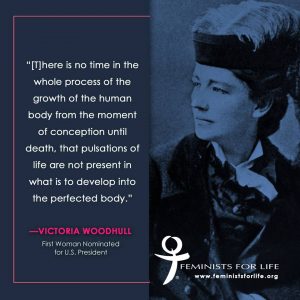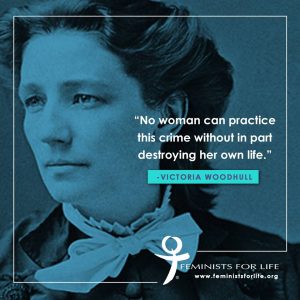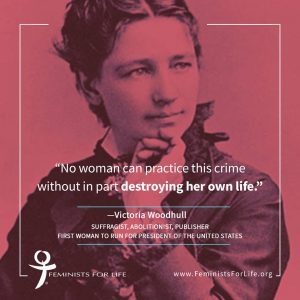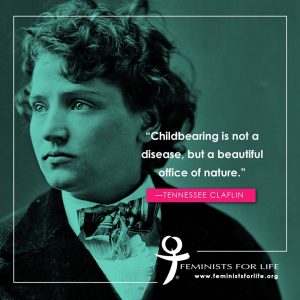Victoria Woodhull (1838-1927) and Tennessee Claflin were flamboyant sisters who rose from poverty to become Wall Street’s first female stockbrokers and major political provocateurs. In 1871, Woodhull argued before Congress that voting rights recently extended to Black men must also apply to women. In 1872, Woodhull became the first woman ever to run for president. Unfortunately, whatever prestige she won as the Equal Rights Party candidate was eclipsed by her trial for obscenity; Woodhull’s exposé of a clerical sex scandal allegedly violated the Comstock Law, and she spent election night in jail. In addition to promoting Spiritualism and “free love,” the sisters’ radical newspaper, Woodhull and Claflin’s Weekly (1870-1876), ran one of the first translations of the Communist Manifesto in America. The mother of a son with special needs, Woodhull insisted that the “murder of unborn children” would continue until whole communities united to aid women in need.
Like her sister Victoria Woodhull, Tennessee (“Tennie C.”) Claflin (1845-1923) courted controversy. Daughters of an alleged charlatan, Woodhull and Claflin left rural Ohio for the concrete wilds of New York. Claflin soon earned a tidy sum as a “spiritual advisor” to railroad magnate Cornelius Vanderbilt, and, in 1870, opened Woodhull, Claflin & Co., the first brokerage house ever run by women, largely for women. It prospered. Unfettered by rumors of sexual impropriety, Claflin co-founded Woodhull and Claflin’s Weekly and ran (unsuccessfully) for Congress. She campaigned for workers’ rights, liberal education, and military service for women, and briefly served as Colonel of an all-Black National Guard regiment. For Claflin, it was not legislation, but “voluntary motherhood”—women’s right to decline sex unless prepared to conceive—that would ultimately end abortion.
“[T]here is no time in the whole process of the growth of the human body from the moment of conception until death, that pulsations of life are not present in what is to develop into the perfected body … Many women who would be shocked at the very thought of killing their children after birth, deliberately destroy them previously. If there is any difference in the actual crime we should be glad to have those who practice the latter, point it out. The truth of the matter is that it is just as much a murder to destroy life in its embryotic condition, as it is to destroy it after the fully developed form is attained, for it is the self-same life that is taken … No woman can practice this crime without in part destroying her own life.”
—From “When Is It Not Murder to Take Life?” Woodhull and Claflin’s Weekly, October 8, 1870
“The rights of children as individuals begin while yet they remain the fœtus.”
—From Woodhull and Claflin’s Weekly, December 24, 1870
“Abortion is only a symptom of a more deep-seated disorder of the social state … Childbearing is not a disease, but a beautiful office of nature. But to our faded-out, sickly, exhausted type of women, it is a fearful ordeal. Nearly every child born is an unwelcome guest. Abortion is the choice of evils for such women. Is there, then, no remedy for all this bad state of things? None, I solemnly believe; none, by means of repression and law. I believe there is no other remedy possible but freedom in the social sphere … It will be when women are thrown more on their own resources, when they mingle on more equal terms with men, when they are aroused to enterprise and developed in their intellects; when, in a word, a new sort of life is devised through freedom, that we can recover the lost ground of virtue, coupled with the advantages of the more advanced age.”
—From “My Word on Abortion, and Other Things” Woodhull and Claflin’s Weekly, September 23, 1871
“Every woman knows that if she
were free, she would never bear an unwished-for child, nor think of murdering
one before its birth.”
—From Wheeling, West Virginia
Evening Standard, November 17, 1875
“We are aware that many women attempt to excuse themselves for procuring abortions, upon the ground that it is not murder. But the fact of resort to so weak an argument only shows the more palpably that they fully realize the enormity of the crime. Is it not equally destroying the would-be future oak to crush the sprout before it pushes its head above the sod, as to cut down the sapling, or cut down the tree? Is it not equally to destroy life, to crush it in the very germ, and to take it when the germ has evolved to any given point in its line of development? …There is still another death method not included in its horrible details … Wives deliberately permit themselves to become pregnant of children and then, to prevent becoming mothers, as deliberately murder them while yet in their wombs. Can there be a more demoralized condition than this?”
—From “Slaughter of the Innocents,” Woodhull and Claflin’s Weekly, June 20, 1874
[Regarding discrimination against
“illegitimate” children:] “No legislation can suppress nature; all life rushes
to reproduction; our procreative faculties are matured early, while passion is
strong, and judgment and self-restraint weak. We cannot alter this, but we can
alter what is conventional. We can refuse to brand an act of nature as a crime,
and to impute to vice what is due to ignorance.’’
—From Talks and Essays, 1897
By Jen Hawkins
Source: Misc. Articles from Woodhull and Claflin’s Weekly







